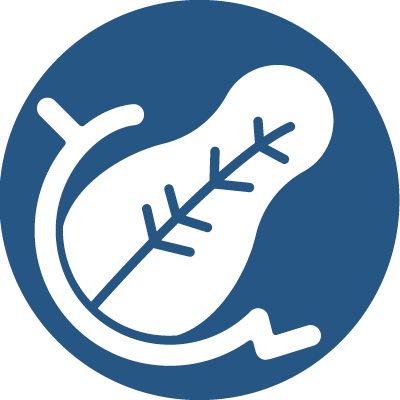
The Pancreas
The pancreas has two main functions: (1) to produce digestive enzymes that help breakdown food in the gut (this is often called the exocrine pancreas) and (2) to produce insulin and glucagon to manage blood sugars (this is often called the endocrine pancreas). In 85% of people with cystic fibrosis, the pancreatic tissue becomes damaged and is replaced with fatty tissue. Initially this causes a lack of digestive enzymes to be produced causing pancreatic insufficiency. As this damage progresses, the pancreas may no longer produce enough insulin which is when a person may be diagnosed with CF-related diabetes.
Most people (approximately 85%) with CF have pancreatic insufficiency which means that more than 98% of the pancreatic tissue that produces digestive enzymes is not functioning. The pancreatic tissue normally produces proteins called enzymes that are released into the gut and help to break down food so the nutrients can be absorbed. When the pancreas does not produce these enzymes, people are at risk for poor fat absorption which leads to deficiency of fat-soluble vitamins (A, D, E, and K), fatty stools, weight loss and malnutrition. About 85% of individuals with CF take pancreatic enzymes by mouth so that they can digest and absorb food normally. People with CF who have poor nutrition are more prone to chest infections therefore, it is important to ensure that you are a healthy weight. This involves eating a “CF Diet” (typically high in calories and fat), taking the appropriate number of enzymes with meals, and ensuring that you are not below the recommended weight range for your height. Read more information on taking enzymes and vitamins.
Pancreatic Sufficiency
About 10-15% of people with CF do not need pancreatic enzyme replacement (meaning less than 98% of their pancreas is destroyed) and they are termed “pancreatic sufficient”. These people are prone to ongoing inflammation of the pancreas, called “pancreatitis”, which can present as central abdominal pain. If someone has repeated episodes of pancreatitis, the pancreas may become damaged to the point where they need to take enzymes with meals to adequately absorb food.
What tests are used to determine if the pancreas is making enough enzymes?
There are several tests that can be done to determine if your pancreas is releasing the proper amount of digestive enzymes to breakdown your food. First, a blood test which measures the trypsinogen (an enzyme required to digest proteins) level, can be done to see if your pancreas is making enough enzymes. If the trypsinogen level is low this suggests that the pancreatic tissue is damaged sufficiently to cause malabsorption and weight loss. Alternatively, a small stool sample can be collected to measure the level of elastase. This is an enzyme made by the pancreas and when the level is low in the stool, this suggests malabsorption and is consistent with pancreatic insufficiency. Finally, a three-day fecal fat test can be performed. For this test, food records are done and stool is collected over a 3-day period. The amount of fat in the stool is measured and high levels of fat in the stool suggest malabsorption and is also consistent with pancreatic insufficiency.
CF-related diabetes (CFRD)
When the pancreas fails to produce enough insulin, this causes diabetes. Up to 40% of adults with CF have CF-related diabetes. Most of those people are diagnosed in their 20’s and are pancreatic insufficient (meaning they need enzymes to absorb the nutrients in food). This happens because in cystic fibrosis, normal amounts of insulin are not always made due to damage to the pancreas. Insulin is a hormone that helps you to use your food for energy and growth, and to build fat and muscle. People with insulin deficiency (low insulin levels) may experience high blood sugar, low energy, weight loss, and decreased muscle size. People may present with non-specific symptoms such as weight loss, decreased energy and feeling unwell and they may have a drop in their lung function. Other symptoms include feeling thirsty all the time and frequent urination.
It is important to understand how sugar is used in the body in order to see how CFRD happens:
- Food containing Carbohydrates (such as bread, pasta, fruit and juice) are broken down into sugar in your stomach.
- The sugar is absorbed into your bloodstream
- Your pancreas makes a hormone called insulin. Insulin works like a key. It “unlocks” the doors to your tissue and muscles so sugar can move from the blood into the tissue cells.
- This sugar is then used by your tissues and muscles for energy
When the pancreas is damaged, it may not be able to make enough insulin to “unlock” the cell doors in the tissues. Therefore, without enough insulin, sugar stays in your blood and cannot get into all of your tissues and muscles for energy.
Avoiding sugary foods and carbohydrates won’t make you less likely to develop CF-related diabetes. It is different from other forms of diabetes. It is very important for people with CF to maintain excellent nutrition and eat a high calorie, high fat diet therefore we do not have CF patients with diabetes restrict their intake of food.
More information on management of CFRD here.

